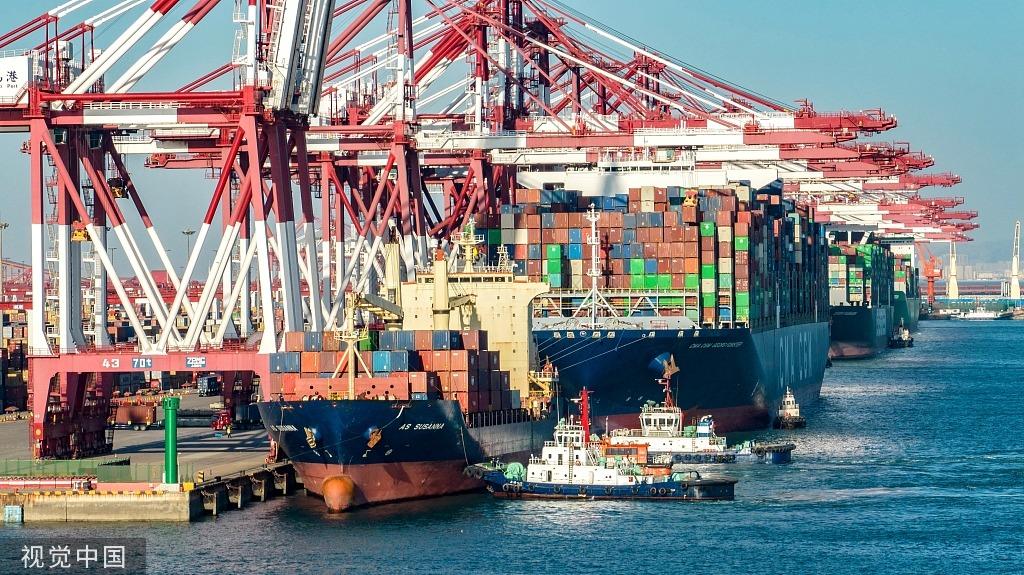 Uploaded containers are seen at Qingdao Port in Shandong province on Jan 9, 2023. (PHOTO / VCG)
Uploaded containers are seen at Qingdao Port in Shandong province on Jan 9, 2023. (PHOTO / VCG)
China is the only country outside of the Americas whose purchases of goods and services from the United States support more than 1 million jobs in the world's largest economy, which is part of the reason policymakers should value the "stabilizing and beneficial" role of trade for both countries, according to the head of a US commerce association.
In 2021, an estimated 1.06 million US jobs were supported by the nation's exports of goods and services to China, ranking the country alongside Canada and Mexico in the 1-million-job provider club, according to the US Exports to China report released last week by the US-China Business Council.
The report noted that 2021 is the latest year for which the employment data are available. During that period, US goods exports to China increased 22 percent year-on-year, and services exports increased slightly, creating an overall healthy environment for export-supported employment in the US.
USCBC President Craig Allen said the report on US exports to China again shows that China's purchases support US businesses and livelihoods, including farmers and ranchers in the heartland, entrepreneurs and innovators in and beyond Silicon Valley, and leaders in the semiconductor sector and manufacturers across the country.
"Every state and congressional district has a unique economic and trade relationship with China," Allen said.
"As policymakers in the United States and China each consider decisions related to the future of the bilateral relationship, it is important that they take into account the stabilizing and beneficial role of trade for both countries," he said.
Figures released by the US Department of Commerce in early February also showed that China maintained its position as the third-largest trading partner of the US for goods in 2022, accounting for 13 percent of total trade, following Canada and Mexico, at 14.9 percent and 14.7 percent.
The USCBC's report noted that China is among the top five markets for all but three states in the US, and that its purchases supported nearly 500,000 more US jobs than the next highest country, the United Kingdom.
The report includes detailed information on exports to China from every US state and congressional district, and the resulting job creation.
For example, it listed California as the top winner in terms of export-supported jobs, with more than 132,400 in 2021, an increase of 15 percent year-on-year.
In contrast, tourism-dependent states, such as Hawaii, saw the number of jobs supported by exports to China shrink by 69 percent, a loss of an estimated 1,900 jobs, according to the report.
In 2022, US goods exports to China increased 1.2 percent year-on-year, led by oilseeds, grains and pharmaceuticals, which saw double-digit growth from the previous year, but the semiconductor and energy sectors saw double-digit contractions, according to the report.
The impact of export control regimes, frequently used by the US, has been particularly felt in the semiconductor sector.
The USCBC report noted that US export controls on advanced semiconductors and semiconductor manufacturing equipment, which took effect in October 2022, inhibited exports to China.
"The more frequent use of export controls over the last few years has led Chinese customers to deprioritize American products when there are viable domestic and third-country suppliers," the report said.
On May 25, during a meeting in Washington with US Commerce Secretary Gina Raimondo, Commerce Minister Wang Wentao raised concerns over US policies on trade with China, as well as issues concerning semiconductors, export controls and a review of outbound investments.
Meanwhile, China has remained the largest source of international students at US campuses, with California, New York and Massachusetts benefiting the most — each seeing a more than $1 billion contribution from hosting Chinese students in 2021, according to the report.
But it also noted that Chinese students are coming to study in lower numbers than before, citing uncertainties related to COVID-19 and travel as the likely chief reasons for a lower economic contribution from Chinese students in 2020 and 2021.
Other possible reasons include worsening geopolitical tensions between the US and China, US visa policies, personal safety considerations and increased competition from UK, Canadian, Australian, Singaporean and Chinese universities.
"These dynamics predate the pandemic and are likely to endure even if travel bounces back," the report stated.


